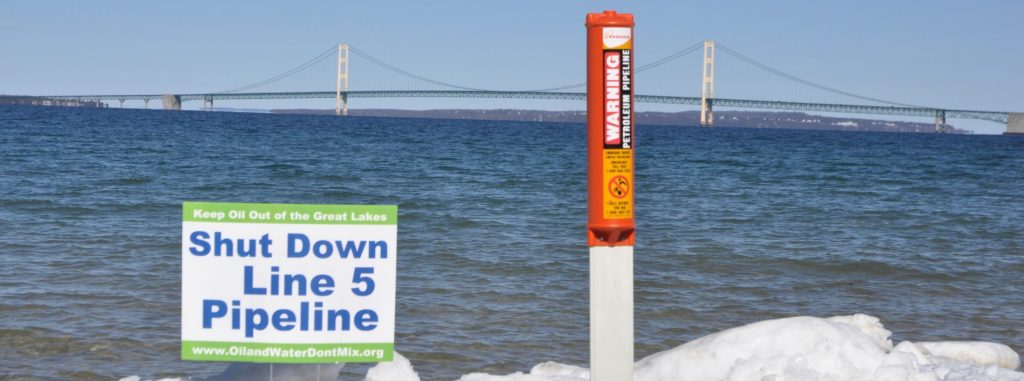The Great Lakes are without a doubt one of the great natural wonders of North America, and as NMU students we have the privilege of experiencing at least one of them firsthand.
Yet, many of us, including myself, live downstate and regularly participate in the ceremony of unifying the lower and upper peninsulas by driving across Michigan’s unofficial state symbol: the Mackinac Bridge.
While crossing the straits, I am sure that I am not the only one who feels a deeper connection with the lakes. And, whether it be fond memories of summer camping trips or simply because they are a part of daily life, the lakes are an integral part of Michigan’s identity and arguably the foundation of its culture.
The ships sailing through the straits are a glimpse into the industrial nature of our state but the real industry lies below their hulls: Enbridge’s Line 5 pipeline.
Enbridge, a publicly traded natural gas distribution company operates out of Calgary, Canada, and holds a major stake in Michigan’s energy industry. But, this kind of industry should not take priority over the safety of the lakes because it poses an unnecessary risk.
It is not surprising that this company has operations in Michigan, but many may not know that Line 5, a 645 mile long pipeline that transports oil products, crosses through the Great Lakes under the Straits of Mackinac.
The company is a goliath in the industry. According to Enbridge’s website, the energy-mover transports over 28 percent of crude oil produced in North America, and operate over 17,000 miles of pipeline.
The Line 5 pipeline was built in 1953 and has operated without incident to this day, but recent concerns over continuously safe operation have been brought up by state officials.
Gov. Snyder signed an agreement with Enbridge in November of 2017 and is quoted as having said, “Business as usual by Enbridge is not acceptable and we are going to ensure the highest level of environmental safety standards are implemented to protect one of Michigan’s most valuable natural resources.”
The steps outlined in this agreement have been hailed by some, including the Pipeline Safety Advisory Board, as not going far enough.
In January, MLive reported that a recommendation by Michigan’s Pipeline Safety Advisory Board to temporarily close the pipeline due to safety concerns was rejected by Gov. Snyder.
As a result, executive director of the National Wildlife Federation Mike Shriberg responded negatively, claiming that the Great Lakes were still at risk.
There’s no denying the economic impact that this pipeline has on the State of Michigan. According to Enbridge’s website, Line 5 transports 55 percent of the state’s propane needs.
Some claim the pipeline is an economic necessity, enough to justify its existence.
Yet, it is clear that the Great Lakes are far more valuable than the oil highway that is running through the intersection of Lake Michigan and Lake Huron.
Enbridge is no stranger to pipeline accidents in Michigan. In 2010, a dramatic oil spill contaminated parts of the Kalamazoo River when the Enbridge 6B pipeline ruptured near Marshall, Michigan. It was considered one of the largest inland oil spills in U.S. history.
We shouldn’t have to learn from the mistakes of former oil pipelines to know that the pristine bodies of water found in our great state are worth protecting.
The safety of the Great Lakes should be an environmental priority regardless of their economic potential, especially when the risks outweigh the benefits.
Unfortunately, Enbridge’s Line 5 pipeline is an unnecessary risk, one that should never have been taken.























